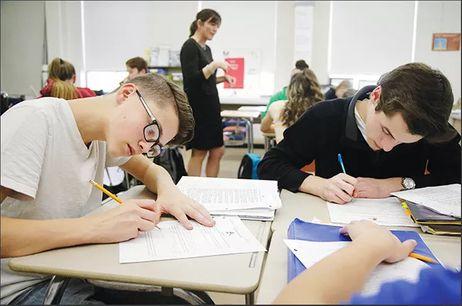As educational leaders experiment with new programs to help turn around the current public school crisis, some experts predict that there will be a rising interest in privatizing many public schools. With public schools struggling to meet standards amidst decreased recessionary budgets, many parents and community members are wondering if their local schools will soon be in the hands of privatized leaders.

Should My Child Enroll in Honors Or General Courses?

When picking classes for the next school year, parents often fret over whether their kids should dive into honors courses. These classes offer more challenges, but do they mean sacrificing top grades? It's a dilemma: better marks or tougher academics? With honors courses demanding extra effort, it's a tough call. So, here are some insights from school and college pros that can help students navigate this critical decision.
Honors vs. General: What's the Big Difference?
While each state and school community has curriculum standards, most honors and general courses adhere to similar philosophical practices. For example, , one of the largest school systems in North Carolina, divides its high school courses into "honors" and "academic" (average) tracks. In examining the differences in Wake County Schools' 9th grade English course options, parents and students can discuss the similarities and differences between the honors and academic options.
- Honors 9th Grade English: Students in both honors and academics must read specific texts from a county-wide reading list. An honors course, however, will generally read more texts than an academic course, as the honors course is conducted at a much faster pace. To work more rapidly through diverse materials, honors students will undoubtedly be assigned more homework than an academic class. Additionally, suppose a student in an honors course falls behind or is struggling. In that case, the student must typically seek out tutoring assistance during their own time (during lunch, before/after school, etc.), as
How AP Courses Benefit a ؛عءدحّ¹ظحّ School Student's Future

Established nearly 60 years ago, Advanced Placement (AP) courses have allowed students across the country to earn college credit even before receiving their high school diplomas. Guided by the College Board, a non-profit organization, AP courses maintain rigorous standards while providing young students with the incredible opportunity to engage in challenging and mature coursework.
However, many parents feel that the AP pathway is simply a "hoop" through which students must jump in order to get into a good college. While students with AP courses on their transcripts tend to experience greater college acceptance rates, experts argue that there are an array of benefits that extend beyond the perks of college admissions.
This video offers an overview of AP courses.
The Advanced Placement Advantages
According to reports, over one million high school students engaged in more than two million AP tests last year. While many high school students simply take AP classes to improve their college application candidacy, there are far greater benefits to these rigorous courses.
College Credit
Colleges today are certainly seeking students with AP experience, as the AP coursework allows college admissions officers to gain greater insight into an applicant's collegiate potential. However, one of the greatest perks of AP coursework is the amount of money that can be cut from a student's tuition bill!
According to the College Board, over 90 percent of colleges and universities in the United States
Are ؛عءدحّ¹ظحّ School Students Prepared for the “Real World?â€

With a seemingly intense focus on standardized tests and rote memorization, are public schools effectively preparing kids for the "real world" beyond high school boundaries? The answers may be troubling.
In fact, nearly 82 percent of college students report that if their secondary educational experiences had established higher standards, they would have happily exerted more rigorous efforts as students. Additionally, as the National Governors Association reveals, approximately 65 percent of current high school students desire more demanding and interesting courses.
As schools struggle to meet academic expectations while simultaneously adjusting to budget cuts, are public school students currently lacking a sound preparedness for life after graduation?
Are Tests Helping Students Gain Relevant Experience?
In an attempt to boost the performance of all public schools, federal legislation implemented the No Child Left Behind act. This act, established nearly a decade ago, mandated increased student testing in order to verify the effectiveness of each individual public school's progress and instructional practices. While this act had ideal intentions, many have realized that the initiative merely distracted students from learning, while emphasizing a new focus on testing and progress scores.
An American Diploma Project, is one of the leading programs striving to foster real-world readiness among public school students. As Achieve reveals, "To close the expectations gap and better prepare students for college and the workplace, states must first ensure that high school standards reflect the real-world skills and knowledge students need to be successful after
Charter Schools vs. Traditional ؛عءدحّ¹ظحّ Schools: Which One is Under-Performing?

Charter schools have become the modern rival of public schools, but does the reality of charter performance match the hype? According to Change.org, "Charter schools get overwhelmingly positive press and make a lot of claims about their success. But actually, numerous studies confirm that their achievement is indistinguishable from that of traditional public schools. Some are very successful, some are troubled and struggling, and the rest are somewhere in between just like traditional public schools."
In a closer examination, charter schools, as explained by t, are publicly funded institutions that operate under their own standards of conduct and curriculum outside the realm of local public school districts. Although these institutions are funded by tax dollars, charter schools are ultimately given the freedom to establish their own methods of operation, similar to how many private schools are able to design their instructional and social practices. According to the , although some state statutes, regulations and rules may still apply to charter schools, they are generally outside the bounds of traditional educational oversight by the state and instead are governed by a board of directors. The original impetus for the creation of charter schools was to increase competition for students, thus giving parents more choices in terms of where their children go to school. It was also theorized that increased competition between public and charter schools would lead to better educational programs for all students.
Recent Articles

















